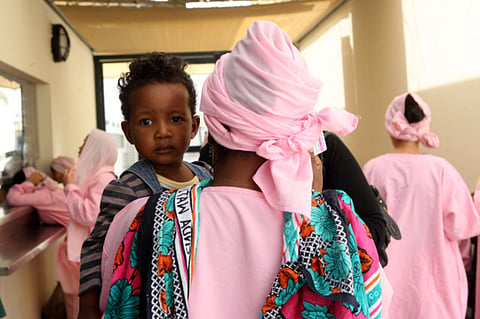Inmates find redemption in Al Aweer jail
Female inmates of a jail in Dubai tell Gulf News about life behind bars and their hopes for the future

Dubai: A group of women are quietly milling around a spacious courtyard at the epicentre of a generous offering of adjacent playgrounds, well-lit rooms, training and workshop facilities, a gym, a dentist’s office and a supermarket. But this is not a boarding school, nor is it a resort.
It is the women’s jail at the General Department of Punitive and Correctional Establishments of Dubai Police at Al Aweer. Encompassing an area of almost a million square metres, the women’s jail embraces the concept of an open penal system with no steel bars within one large, sealed off compound.
More than 400 female inmates of various nationalities are housed here, part of a large correctional operation that also accommodates a separate men’s jail as well as a juvenile centre on grounds nearby.
In the past, thousands of women of different nationalities with criminal histories have represented years of progress and reform behind the prison walls and have been released from the facility after learning new skills that will help them embrace a new life.
Free to roam
It is an open-jail concept —the jail cells are not locked, and all prisoners interact with
others. At any given moment during the day, one can witness prisoners roaming around the backyard, playing with their children, buying from the supermarket or chatting with each other.
Female convicts can talk to correctional officers guarding the prison freely and openly about their problems, needs and how they feel. Guards are peaceful, strong and kind at the same time, inmates say.
This is anything but a traditional detention centre such as a maximum security prison where inmates are given few personal privileges and spend their morning and afternoon breaks, lunches and dinners moving from one locked corridor to another.
There is an air of acceptance here among inmates, who are doing their best to rehabilitate and learn in order to offset the serious and at times tragic decisions they made in their past that led them to this incarceration.
One female prisoner on death row, who won’t share her name, confides that she has found life again inside the women’s jail where she has memorised the Quran and is now sharing her newfound knowledge with other inmates.
The inmate is now teaching other prisoners to learn, recite and memorise the Quran.
Donning standard prison issue clothing — with a red patch on the left side of her dress that denotes she is a death-sentence prisoner — the Pakistani inmate fully understands the gravity of her situation.
The uniform is a long, pink blouse and trousers with a colour-coded patch on the right side of the chest indicating the sentencing time to be served. Red indicates a sentence of more than seven years, yellow for three to seven years, blue for three years to six months and green for less than six months.
Roughly 15 years ago, the woman on death row and her three brothers killed her husband’s second wife. She said her brothers are also on death row in the men’s jail.
The woman said she cannot change what happened but has sought reformation through her Quran teachings in the jail. Sulaima is a female inmate serving seven yearsl after being convicted of smuggling drugs into the country.
No option
Clutching a notebook as she prepared to attend her Quran class, the woman contends that she did not knowingly play the role of a drugs mule and that she was carrying the suitcase of another woman when she was coming from Iran.
“I’m a 45-year-old and mother of five children who lives in Iran. My husband passed away, leaving the children for me,” she said. Sulaima said her elder son is mentally ill.
“I’m here for almost one year. The jail is good and clean and the wardens are kind and nice, but I miss my children,” she said.
Other female prisoners have no other option than to bring their children with them when they enter the women’s jail in Al Aweer because there is no one on the outside world to take care of them.
Jail authorities recognise the problem and provide proper shelter, nutrition and environment to help female inmates care for their children in the prison while serving out their sentence.
Dana, from Nigeria, cares for her two children, ages one and three, in the jail, and said that she had her children out of wedlock resulting in her prison term. “I’m just waiting for deportation. My consulate issued outpasses for my children,”
she said. Ushaka, an African woman serving 15 years in jail for drug smuggling, was smiling and laughing and generally relaxed when we met her.
“I’m happy here, we are treated well,” she said.



